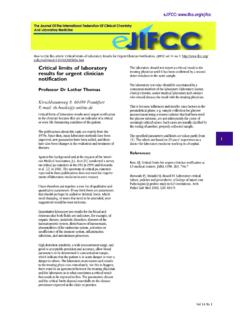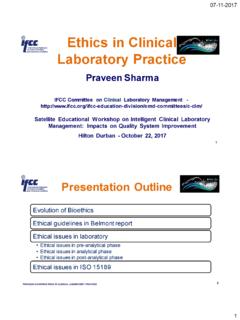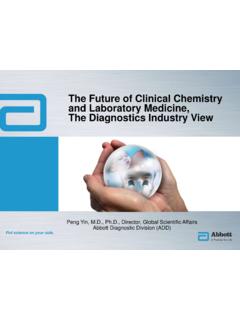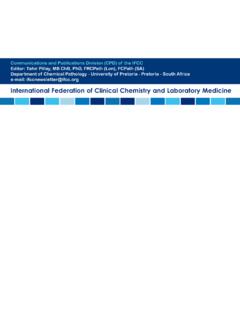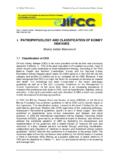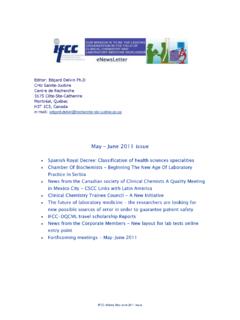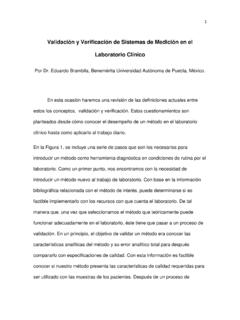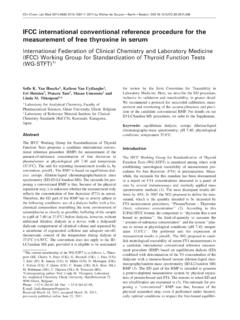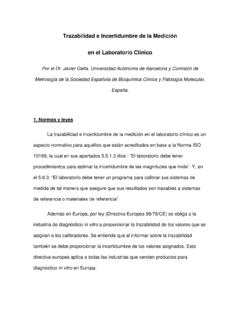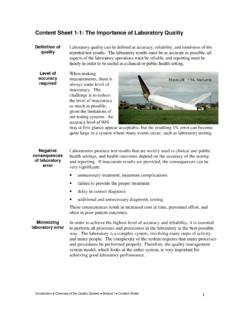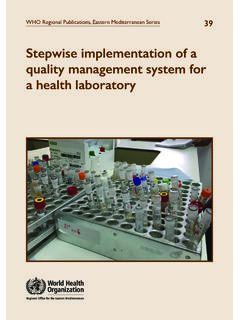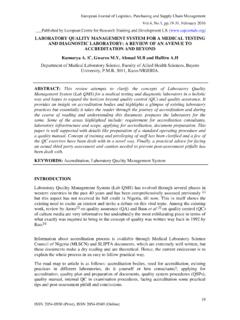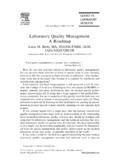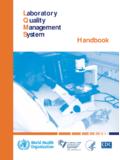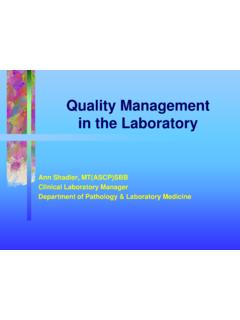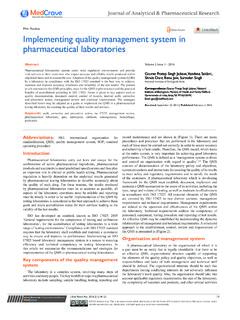Transcription of Essentials of Clinical Laboratory Management in …
1 Essentials of Clinical Laboratory Management inDeveloping RegionsDr. Wim de Kieviet, The Netherlands, chair C-CLM, EditorDr. Elizabeth Frank, India, member C-CLMDr. Herbert Stekel, Austria, member C-CLMC ommittee on Clinical Laboratory Management (C-CLM)Education and Management Division (EMD)IFCCE ssentials of Clinical Laboratory Management in developing RegionsContentsPageChapter 1: Why Essentials of Clinical Laboratory Management in developing Regions?5 Chapter 2: Managerial guidelines to set up a Clinical Laboratory under difficult circumstances7 Chapter 3: Basic Level of Laboratory Information Systems (LIS)17 Chapter 4: essential guidelines for Total quality Management &Accreditation based on ISO 1518930 Chapter 5: Basic training in managerial skills43 Chapter 6: Basic quality Control at low cost52 Chapter 7: Environmental Conditions593 Essentials of Clinical Laboratory Management in developing Regions5 Chapter 1 Why Essentials of Clinical Laboratory Management in developing Regions?
2 Wim de Kieviet, IntroductionThe IFCC supports worldwide the work and activities of Clinical laboratories. The needs of Clinical laboratoriesin general and of specialists in Clinical chemistry and Laboratory medicine in particular differ not only fromcountry to country, but also from Laboratory to Laboratory . In general the main efforts of the IFCC have been focussed on raising the quality and functionality of alreadygood-level Clinical laboratories. These laboratories are present in the so called developed countries as wellas, to a minor extend, in the so called developing countries. The terms developed and developing countriesonly reflects the financial possibilities and the availability of professional know-how on the field of clinicalchemistry and Laboratory medicine. It has no relation with the cultural and social status of the inhabitants ofa countries with less financial possibilities the situation in the Clinical laboratories differs strongly fromlocation to location.
3 In those countries well equipped and well organised laboratories exist next to laboratorieswith minimal diagnostic possibilities and a lack of good educated Essentials of Clinical Laboratory Management ( essential guidelines) of the Committee on ClinicalLaboratory Management (C-CLM) of the IFCC has been written to support the development of low-levelclinical laboratories in developing countries. The essential guidelines have the only intention to provide toolsfor those laboratories which they can use in their own is important that the development of Clinical laboratories in developing countries is performed by their ownstaff and in a direction that is suitable for their local situation. It is not the intention of the essential guidelines to bring all Clinical laboratories of the world to the same level,because the required local level differs too much. The intention is supply tools to enforce the local laboratorydiagnostics.
4 Aims of the essential guidelinesThe essential guidelines describe the minimal requirements of different topics. They are written in a compactway to give a quick insight in the problems to solve. The essential guidelines do not have the intention toprovide a comprehensive overview of the themes. There are good handbooks and publications available ofall the topics when the highest level is required. The Basic Guidelines will help with the decisions about 'whatto do first and what to do later on'. Topics essential guidelinesThe topics described in this monograph are:1. Managerial guidelines to set up a Clinical Laboratory under difficult circumstancesThese guidelines inform about the managerial ins and outs in the case of the set up of a clinicalaboratory under difficult circumstances. They describe the essential elements of the business plan, thethreats and opportunities, and the cost analysis.
5 Also already existing Clinical laboratories can checktheir situation with these Basic level of Laboratory Information Systems (LIS)One of the essential parts of the Clinical Laboratory is the Laboratory Information system (LIS) tocontrol the whole process in the Laboratory . The guidelines describe the basic functionalities whichare essential for labo ratories with minimal resources the printing of Laboratory of Clinical Laboratory Management in developing Regions63. essential guidelines for Total quality Management & Accreditation based on ISO 15189 Even under difficult circumstances the quality of the work of the Clinical Laboratory is important. In developed countries accreditation systems according to ISO norms are used to secure andenhance the quality of the Laboratory diagnostics. The guidelines describe the essential parts of theISO norms 15189. Under difficult circumstances it is impossible to set up a quality system whichfulfils all norms within a reasonable time, but with the help of the guidelines the start of the introduction ofthe quality system is within hands reach.
6 The introduction of the quality system will eventually leadsto a system of Total quality Basic training in managerial skillsSpecialists in Laboratory medicine are not only expected to be professional experts but arealsoexpected to be excellent managers of their laboratories. With minimal financial possibilities it isdifficult to train the managerial skills. In this monograph practical possibilities for low-cost managerial trainings are described. 5. Basic quality control at low costQuality control is essential under all circumstances. This chapter describes the necessity and low cost possibilities the internal and external quality control for medical Environmental conditionsIn developing countries the environmental conditions are not always optimal. This chapter describes theeffect of the different environmental The Committee on Clinical Laboratory Medicine (C-CLM)The Committee on Clinical Laboratory Medicine (C-CLM) is part of the Education and Management Division(EMD) of the International Federation of Clinical Chemistry and Laboratory Medicine (IFCC).
7 The C-CLMproduces guidelines for colleagues who have to work in difficult financial and supportive situations. The C-CLM can also help by realizing twinning relations between Clinical laboratories in developed anddeveloping countries. The C-CLM has the conviction that although assistance of colleagues working under difficult circumstancesis important, the work itself has to be done by the local colleagues. Only by their work the level of laboratorydiagnostics for the local patients will of Clinical Laboratory Management in developing Regions7 Chapter 2 Managerial guidelines to set up a Clinical Laboratory under difficult circumstancesWim de AimTo provide guidelines for specialists in Laboratory medicine to set up a Clinical Laboratory with minimalfinancial and material Introduction'The fundamental solutions to Africa's health problems lie with African people themselves. The main duty ofthe international community is to create the conditions that will allow Africa to develop and flourish.
8 ' as statedby Sanders, Todd and Chopra (1). The creation of circumstances in which the local workers can flourish isimportant for all developing countries. Focused on Clinical laboratories in developing countries, the Educationand Management Division (EMD) of the IFCC installed the Committee on Clinical Laboratory Management (C-CLM) to support the local workers in their attempts to serve the local population with Laboratory care. The setup of a Clinical Laboratory in developing regions, which fulfils minimal quality requirements, is difficultto achieve when the financial and material possibilities are insufficient. In most cases information andguidelines are used from societies of Laboratory medicine from developed countries. It is then disappointingthat not all items of the guidelines can be C-CLM has recognized these problems and has started the series of monographs of guidelines whichfulfil "minimal requirements".
9 This guideline will give information about the basic managerial needs for a Clinical Laboratory under Business planThe first step in the set up of a Clinical Laboratory is the formulation of the intention in a plan, the so calledbusiness plan. This business plan gives information about the justification to set up the new founded clinicallaboratory. It makes an inventory of the opportunities and threats of the organization. The business planshould minimally contain the following elements: The aim of the Clinical Laboratory organization based on the established needs of the region. Too ambitious and not realistic aims are not fruitful for the success of the new organization The outcome of the search about the needs of the region on the field of Laboratory medicine. Other already existing regional Clinical laboratories have to be described in the business plan. The searchhas to be based on real information from all kind of medical informants.
10 Consulting the generalpractitioners (GP's) to get a good insight in the regional situation can be very helpful. The regional search can be facilitated by following the questionnaire of the branch-analysis of the region in table of Clinical Laboratory Management in developing Regions8 Table 1. Questionnaire branch-analysis of the regionWhich Clinical laboratories are present in the region?Are there new Clinical laboratories entering themarket in the region?What are the reasons that too less clinicallaboratories have entered the regional market? What is the percentage of the requested Laboratory tests which has to be sent to outside the region?What is the percentage of the regional population without access to a Clinical Laboratory ?What are the reasons that (a part of) the population has no access to a Clinical Laboratory ?What are the expectations of the growth in the requestsof Laboratory -tests in the region?Are there local providers of Laboratory equipment?
